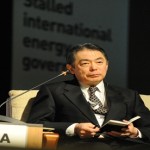Aizawa said that increased reliance on fossil fuels is undesirable from an environmental viewpoint. Japan has some 50 nuclear power plants. All have been shut down since 2011. On March 11 that year four of six nuclear power plants at the Fukushima Dai-ichi plant site suffered massive damage as a result of a magnitude 9 earthquake and a series of tidal waves as high as 16 meters.
Although expressing regrets that the Fukushima accident caused concern for neighboring countries including South Korea, Aizawa took issue with reports of radiation contamination including of sea water in fishing grounds near the crippled reactors and stressed that TEPCO was committed to working with the Japanese government to decommission all six power plants on the Dai-ichi site while remaining a producer of nuclear generated electricity.
Asked about leaks of contaminated sea water from tanks at the power plant site, Aizawa said seepage has been limited and the quality of water in fishing grounds near the power plants was not affected. “We are monitoring the water for content of radiation-related materials and these are at such low levels as to be non-detectable,” Aizawa said. Fresh water is being used to stabilize the reactor cores which still contain radioactive materials. Accumulating at 400 tons per day the water is stored in tanks many of which were hastily constructed immediately after the quake. “We are now using welded tanks so we do not expect any further leakage, and we are also removing some 60 radioactive contaminants from the water in the tanks in the plant grounds.” he said.
“The water outside the harbor area is at the same level of purity as before the accident.” Aizawa said he eats sushi twice a week and “so far I am in perfect health.” He added that radiation-related contamination accumulates at the bottom of the ocean so deep sea fish are not caught near the Fukushima area. “What is sold in food stores and restaurants in Japan is perfectly all right to eat,” he said.
South Korea has banned the imports of Japanese marine products from Fukushima and nearby areas.
Aizawa stated that TEPCO has a road map for decommissioning the Dai-ichi site, adding that complete decommissioning is expected to take 40 years. Aizawa said his firm is keen to engage in decommissioning on its own and that it opposed the setting up of a government-run decommissioning agency as in Britain.
“Using the same staff to decommission the plant and rotating them to plants that continue to generate electricity results in effective use of human resources,” he said citing the fact that staff cannot be kept on the Fukushima plant site for long periods because there are limits on the amount of radiation they can be exposed to. “Besides, our staff feel proud to be working for a company that generates electricity. That is where their heart lies.”
This news story is based on the Face to Face session, "Post-Fukushima nuclear challenges", at the 2013 World Energy Congress.






